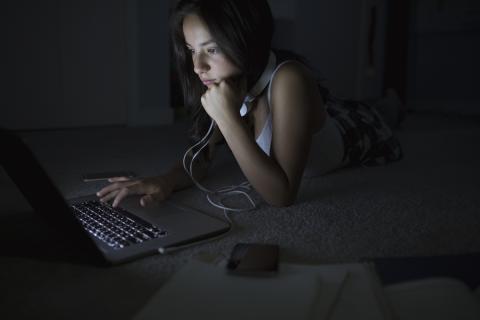
While tech has become integrated in the lives of parents and teens, there are positives and negatives that come with it. One problem? When our handheld devices affect our sleep – and this is a particular issue for teens.
The Canadian Paediatric Society states that teens need 8 to 10 hours of sleep. Meanwhile, the National Sleep Foundation says 8 out of 10 American teens are not getting adequate amounts of sleep on a school night. That’s a lot of sleep debt.
Plus, MediaSmarts’ Screen time and well-being fact sheet indicates that 29% of teens who are cell phone users are awakened by phone notifications. Not cool.

You may not know exactly how much sleep your teen is actually getting, but according to the Canadian Paediatric Society there are a few signs that they are missing out. These include difficulty waking up in the morning, trouble concentrating throughout the day or even falling asleep during classes, moodiness and feeling depressed (visit their website for more information including when it’s time to see your family doctor).
So if teens aren’t getting enough sleep, what can we do? Alanna McGinn is the founder of Good Night Sleep Site, a certified sleep expert and parent herself (of a teen and tweens). She knows a lot about sleep and is always the person I turn to when I have questions about it or someone in my family is struggling, as she’s been a client and friend for over a decade.
McGinn has seen a rise in the need for tween and teen sleep support over the years. This has led her to write many teen sleep articles (like this article with suggestions on what you need to know about your teen’s sleep).
She tells me that tech can be an issue at bedtime. "I recommend putting electronics away at least 60 minutes before bedtime for all ages, and that includes adults. If you have older teens like I do, I understand if you want to watch a show together before bed, but that's not the time to watch something scary or anxiety-inducing."
MediaSmarts’ research has shown that 80% of youth in grades 4 to 11 keep their smartphones in their bedrooms at night, which has been found to reduce sleep quality.
One way to keep the phones out of the bedrooms?
"Creating a family docking station to keep phones out of the bedroom can help prevent the temptation for everyone to use their phone or answer notifications instead of sleeping."
And the old ‘but it’s my alarm clock’ excuse doesn’t need to be a justification either. McGinn suggests that, instead, families should get a basic alarm clock just for that purpose.
Keep in mind, though, that one reason kids want to have phones in their bedrooms is so they’ll be available to friends who might need their support. So, if you’re making a new rule about keeping phones out of bedrooms, give them a chance to let their friends know they won’t be available until the next morning.
Bedtime with tweens and teens may look different than when they were babies and toddlers, but McGinn says there’s still a chance to spend time together and connect, and that it’s good for the bedtime process. "That wind-down time before bed is important, and a lot of us like to check our phones during it. Instead, I recommend a quiet, soothing activity like reading, colouring or maybe a family board game. Your kids will like the connection just as much as you."
I know what it’s like having older kids with unusual work schedules and who are cramming in homework deadlines and want to text with their friends (instead of being on the telephone like we used to be in high school). As they get older, we have to be realistic when it comes to screen time.
But if we establish positive sleep habits and routines early on and help them create a calming bedtime that doesn’t rely on tech, those skills will be long lasting as they grow and become adults. At least that’s the hope!
Related resources:
- Screen time and well-being - Fact Sheet
- Dealing with digital stress
- Young Canadians in a Wireless World research on Life Online
